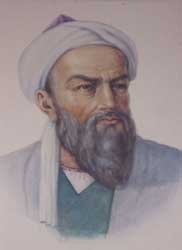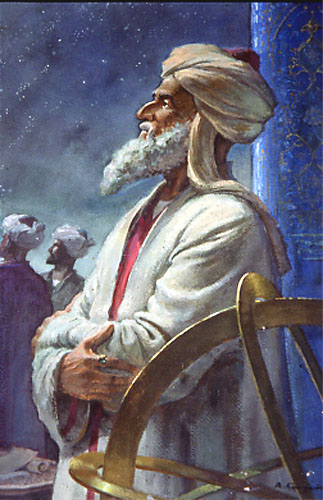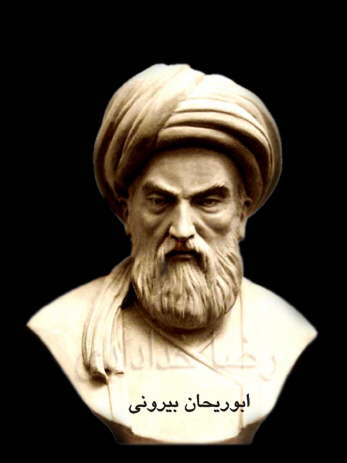<Back to Index>
- Natural Scientist and Polymath Abu al-Rayhan Muhammad ibn Ahmad al-Biruni, 973
PAGE SPONSOR



Abū al-Rayḥān Muḥammad ibn Aḥmad al-Bīrūnī (born 5 September 973 in Kath, Khwarezm, died 13 December 1048 in Ghazni), known as Alberonius in Latin and Al-Biruni in English, was an Iranian - Chorasmian Muslim scholar and polymath of the 11th century.
Al-Biruni is regarded as one of the greatest scholars of the medieval Islamic era and was well versed in physics, mathematics, astronomy and natural sciences, and also distinguished himself as a historian, chronologist and linguist. He was conversant in Chorasmian, Persian, Arabic, Sanskrit and Turkic, and also knew Greek, Hebrew and Syriac. He spent a large part of his life in Ghazni, modern - day Afghanistan, and in 1017 traveled to the Indian subcontinent. He became the most important interpreter of Indian science to the Islamic world. He is given the titles the "founder of Indology" and the "first anthropologist". He was an impartial writer on custom and creeds of various nations, and was given the title al-Ustdadh ("The Master") for his remarkable description of early 11th century India. He also made contributions to Earth sciences, and is regarded as the "father of geodesy" for his important contributions to that field, along with his significant contributions to geography.
He was born in the outer district of Kath, the capital of the Afrighid dynasty of Chorasmia. The word Biruni means outer district in Persian, and so this became his nisba: "al-Bīrūnī" = "the Birunian". His first twenty - five years were spent in Chorasmia where he studied fiqh, theology, grammar, mathematics, astronomy, medics and other sciences. The Iranian Chorasmian language, which was the language of Biruni, survived for several centuries after Islam until the Turkification of the region, and so must some at least of the culture and lore of ancient Khwarezm, for it is hard to see the commanding figure of Biruni, a repository of so much knowledge, appearing in a cultural vacuum.
He was sympathetic to the Afrighids, who were overthrown by the rival dynasty of Ma'munids in 995. Leaving his homeland, he left for Bukhara, then under the Samanid ruler Mansur II the son of Nuh. There he also corresponded with Avicenna and there are extant exchanges of views between these two scholars.
In 998, he went to the court of the Ziyarid amir of Tabaristan, Shams al-Mo'ali Abol-hasan Ghaboos ibn Wushmgir. There he wrote his first important work, al-Athar al-Baqqiya 'an al-Qorun al-Khaliyya (literally: "The remaining traces of past centuries" and translated as "Chronology of ancient nations" or "Vestiges of the Past") on historical and scientific chronology, probably around 1000 A.D., though he later made some amendments to the book. Accepting the definite demise of the Afrighids at the hands of the Ma'munids, he made peace with the latter who then ruled Chorasmia. Their court at Gorganj (also in Chorasmia) was gaining fame for its gathering of brilliant scientists.
In 1017, Mahmud of Ghazni took Rey. Most scholars, including al-Biruni, were taken to Ghazna, the capital of the Ghaznavid dynasty. Biruni was made court astrologer and accompanied Mahmud on his invasions into India, living there for a few years. Biruni became acquainted with all things related to India. He may even have learned some Sanskrit. During this time he wrote the Kitab ta'rikh al-Hind, finishing it around 1030.
Ninety - five of 146 books known to have been written by Bīrūnī, about 65 percent, were devoted to astronomy, mathematics, and related subjects like mathematical geography.
Al-Biruni contributed to the introduction of the experimental scientific method to mechanics, unified statics and dynamics into the science of mechanics, and combined the fields of hydrostatics with dynamics to create hydrodynamics.
Bīrūnī also devised his own method of determining the radius of the earth by means of the observation of the height of a mountain and carried it out at Nandana in India.
Due to an apparatus he constructed himself, he succeeded in determining the specific gravity of a certain number of metals and minerals with remarkable precision.
Biruni's
main essay on political history, Ketāb al-mosāmara fī aḵbār Ḵᵛārazm
(Book of conversation concerning the affairs of Ḵᵛārazm) is now known
only from quotations in Bayhaqī’s Tārīḵ-e masʿūdī. In addition to this
various discussions of historical events and methodology are found in
connection with the lists of kings in his al-Āṯār al-bāqīa and in the
Qānūn as well as elsewhere in the Āṯār, in India, and scattered
throughout his other works.
Bīrūnī is one of the most important Muslim authorities on the history of religion. Al-Biruni was a pioneer in the study of comparative religion. He studied Zoroastrianism, Judaism, Hinduism, Christianity, Buddhism, Islam and other religions. He treated religions objectively, striving to understand them on their own terms rather than trying to prove them wrong. His underlying concept was that all cultures are at least distant relatives of all other cultures because they are all human constructs. “What al-Biruni seems to be arguing is that there is a common human element in every culture that makes all cultures distant relatives, however foreign they might seem to one another.” (Rosenthal, 1976). Al-Biruni was disgusted by scholars who failed to engage primary sources in their treatment of Hindu religion. He found existing sources on Hinduism to be both insufficient and dishonest. Guided by a sense of ethics and a desire to learn, he sought to explain the religious behavior of different groups.
Al-Biruni divides Hindus into an educated and an uneducated class. He describes the educated as monotheistic, believing that God is one, eternal, and omnipotent and eschewing all forms of idol worship. He recognizes that uneducated Hindus worshiped a multiplicity of idols yet points out that even some Muslims (such as the Jabiriyya) have adopted anthropomorphic concepts of God. (Ataman, 2005)
Bīrūnī’s fame as an Indologist rests primarily on two texts. Al-Biruni
wrote an encyclopedic work on India called “Tarikh Al-Hind” (History of
India, also known as “Indica,” or simply “India”) in which he explored
nearly every aspect of Indian life, including religion, history,
geography, geology, science and mathematics. He explores religion
within a rich cultural context. He expresses his objective with simple
eloquence: I shall not produce the arguments of our antagonists in order
to refute such of them, as I believe to be in the wrong. My book is
nothing but a simple historic record of facts. I shall place before the
reader the theories of the Hindus exactly as they are, and I shall
mention in connection with them similar theories of the Greeks in order
to show the relationship existing between them. An example of Al-Biruni’s analysis is his summary of
why many Hindus hate Muslims. He explains that Hinduism and Islam are
totally different from each other. Moreover, Hindus in 11th century
India considered all foreigners, not just Muslims, impure and refused to
have any connection with them. Furthermore, when the Muslims entered
India, the land had already been devastated by two previous invasions by
the Sakas and the Hunas. On top of that, Mahmud of Ghazni, the Muslim
sultan of India and a contemporary of al-Biruni, plundered the wealth of
the region. Al-Biruni intended to facilitate dialogue
between Hindus and Muslims. He thought that the two groups had a great
deal they could learn from one another. Al-Biruni collected books and studied with Hindu scholars
to become fluent in Sanskrit. He translated books both from Sanskrit to
Arabic and vice versa. While others were killing each
other over religious differences, Al-Biruni had a remarkable ability to
engage Hindus in peaceful dialogue. Mohammad Yasin puts this
dramatically when he says, “The Indica is like a magic island of quiet,
impartial research in the midst of a world of clashing swords, burning
towns, and burned temples.” (Indica is another name for Al-Biruni’s
history of India). (Yasin, 1975).
Most of the works of Al-Biruni are in Arabic although he wrote one of his masterpieces, the Kitab al-Tafhim apparently in both Persian and Arabic, showing his mastery over both languages. Bīrūnī’s catalog of his own literary production up to his 65th lunar / 63rd solar year (the end of 427 / 1036) lists 103 titles divided into 12 categories: astronomy, mathematical geography, mathematics, astrological aspects and transits, astronomical instruments, chronology, comets, an untitled category, astrology, anecdotes, religion and books of which he no longer possesses copies. His extant works include:
- Critical study of what India says, whether accepted by reason or refused (Arabic تحقيق ما للهند من مقولة معقولة في العقل أم مرذولة), also known as the Indica - a compendium of India's religion and philosophy
- The Book of Instruction in the Elements of the Art of Astrology (Kitab al-tafhim li-awa’il sina‘at al-tanjim).
- The Remaining Signs of Past Centuries (Arabic الآثار الباقية عن القرون الخالية) - a comparative study of calendars of different cultures and civilizations, interlaced with mathematical, astronomical and historical information.
- The Mas'udi Canon (Persian قانون مسعودي) - an extensive encyclopedia on astronomy, geography, and engineering, named after Mas'ud, son of Mahmud of Ghazni, to whom it was dedicated.
- Understanding Astrology (Arabic التفهيم لصناعة التنجيم) - a question and answer style book about mathematics and astronomy, in Arabic and Persian.
- Pharmacy - about drugs and medicines.
- Gems (Arabic الجماهر في معرفة الجواهر) about geology, minerals, and gems, dedicated to Mawdud son of Mas'ud.
- Astrolabe.
- A historical summary book.
- History of Mahmud of Ghazni and his father.
- History of Khawarazm.